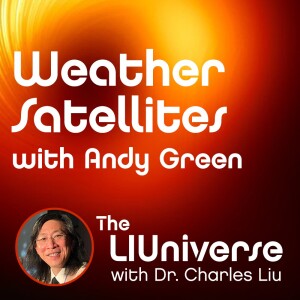
Saturday Mar 18, 2023
The LIUniverse: Weather Satellites with Andy Green
Can you turn your passion for science into a career that helps keep millions of people safe from severe weather and includes launching your own satellites into space? To find out. Dr. Charles Liu and co-host Allen Liu welcome Andy Green, the entrepreneur and self-confessed computer nerd who runs MyRadar.
As always, though, we start off with the day’s joyfully cool cosmic thing, which has to do with weather... but on another planet! We’re talking about the latest infrared image of Jupiter showing storms, auroras, and atmospheric conditions on the planet’s surface, taken by the James Webb Space Telescope and processed by a citizen scientist, Judy Schmidt, who has been doing this as a hobby for years!
Our guest, Andy Green, turned his lifelong passion for science and computers into the MyRadar app, which helps 13 million active users keep one step ahead of tornadoes, hurricanes and other severe weather that’s happening with increased frequency and severity due to climate change.
He’s the perfect person to answer our student question, which comes from Anthony: “How much impact and change do you actually see from global warming in the near future?” Unfortunately, says Andy, the answer is quite a bit, as he discusses, among other things, the increased incidences of wildfires and flooding we’re seeing on a global basis. And while weather and climate are different, Andy – who’s been staring at raw weather data for the last ten years – says, “It’s hard to escape the reality that storms have been becoming more and more severe, and the impacts from the storms have been more devastating to people.”
Next, Charles and Andy discuss how the US is the world leader in tornadoes, and whether Tornado Alley is shifting and growing over time. Andy explains how MyRadar has been expanding to offer more science education to its users, as well as better warnings for wildfires and non-weather-related events like impending earthquakes, and more. MyRadar is even launching their own satellites to provide even better data, getting them into low earth orbit via commercial space launch companies like Rocket Lab. Andy shares about how his engineers and scientists developed the MyRadar “Project Horis” nanosatellites, which will have solar panels and a suite of sensors onboard, including a hyperspectral imager, a thermal imager, and a visual camera. He even shows us one of his CubeSat prototypes and explains how they stay in orbit, what allows them to change what the satellite is pointing at, and why every newly launched satellite is required to include a deorbiting plan.
And then it’s time to geek out. Andy tells Chuck how he got into computers when he was 9 years old in the 70s with Radio Shack’s TRS-80 and has been a computer nerd ever since. He learned how to code, and fell in love with the feeling of power that gave him and set him on the course he’s still on today. He even has a Model 3, which he shows us during the video. (And if you’re just listening, don’t worry: Chuck gives you a colorful description. Can you say floppy drive?) The conversation flows from the evolution of computers and computer games, to artificial intelligence, to the benefits of augmented reality glasses and virtual reality games.
If you’d like to know more about Andy and MyRadar, go to www.myradar.com, and to hear about Project Horis, visit www.myradar.space.
We hope you enjoy this episode of The LIUniverse, and, if you do, please support us on Patreon.
Credits for Images Used in this Episode:
– Jupiter in infrared as seen by JWST – NASA / ESA / CSA / Jupiter ERS Team / Ricardo Hueso Alonso / Judy Schmidt, CC BY 2.0
– A launch of Rocket Lab’s Electron rocket – National Reconnaissance Office, Public Domain
– Rocket Lab’s launch site on New Zealand’s Mahia peninsula – Grumpy Eye, CC BY-SA 2.0
– Carving of the Egyptian god Horus 19th Dynasty, photographed by Tangopaso, Public Domain
No comments yet. Be the first to say something!